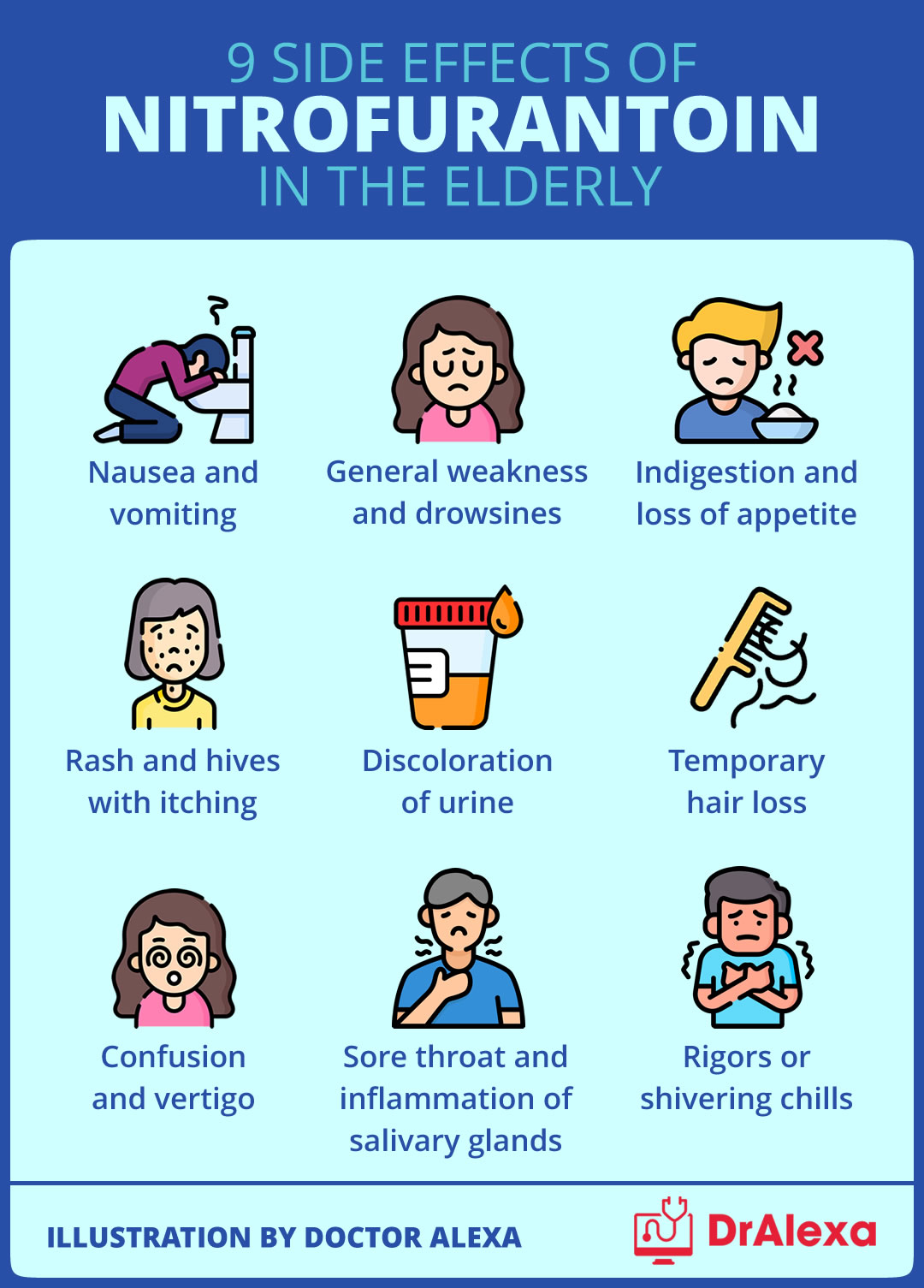Nitrofurantoin is a widely recommended antibiotic medication typically used to eliminate bacteria in the urinary tract system. Sometimes, healthcare professionals prescribe Nitrofurantoin for infections caused by bacteria in the urinary system. Antibiotics like Nitrofurantoin will not treat flu, colds, or other viral infections. However, due to its mechanism of action, this medication can be a potent antibiotic against bacterial infections in the urinary tract. This article comprehensively discusses Nitrofurantoin, its side effects, and dosages, as well as provides answers to questions like ‘What can Nitrofurantoin be used to treat?’ Read on to learn more about this medication.
What is Nitrofurantoin?
As previously stated, Nitrofurantoin is an antibiotic usually recommended to treat urinary tract infections caused by bacteria.
It can also be used as a prevention medication against UTIs, such as cystitis. Nitrofurantoin brand names include Aratoin, Furadantin, Macrobid, and Macrodantin.
Nitrofurantoin is unique from other antibiotics. The medication’s uniqueness comes from how the drug is absorbed in the body when used.
The body rapidly filters Nitrofurantoin out of the blood, sending it down to the urine.
This forms a concentration of the medication in the bladder, where it can eliminate bacteria at the site of the UTI. However, this means that Nitrofurantoin will not work for other infections.
Nitrofurantoin is a prescription antibiotic available in tablets, capsules, and oral suspension forms, depending on patient preference.
What can Nitrofurantoin be used to treat?
Nitrofurantoin is usually prescribed to treat bacterial infections in the urinary tract. This includes infections in the bladder, kidneys, or urethra.
The medication’s mechanism of action makes it a potent treatment option against UTIs.
This is because Nitrofurantoin is usually rapidly filtered from the blood and passed into the urine, where it remains concentrated to eliminate or prevent bacteria from thriving at the site of the infection.
It is vital to note that as a prescription medication, Nitrofurantoin must only be recommended by a licensed healthcare professional after carefully examining your symptoms and diagnosis following tests. Common symptoms of a UTI include:
- Frequent urination
- Pain or burning feeling when urinating (dysuria)
- Persistent and urgent urge to pee
- Cloudy urine
- Bloody urine
- Back pain
- Fever
- Unusually smelly or dark urine
What conditions can Nitrofurantoin treat?
Nitrofurantoin treats uncomplicated urinary tract infections because it is potent against most gram-positive and gram-negative organisms. Nitrofurantoin is also used in the prevention of urinary tract infections. These include the following;
- Kidney infections
- Urethra infections
- Cystitis
Can you order Nitrofurantoin online?
Patients can request and purchase a Nitrofurantoin prescription on the Internet. Nitrofurantoin is a prescription antibiotic. Therefore, you will require a prescription from a licensed healthcare professional to buy the medication.
You must never buy Nitrofurantoin without a prescription from a medical expert or professional for your safety and well-being.
Doctor Alexa offers you access to world-class healthcare services from the convenience and comfort of your home. You can schedule a consultation with one of our highly qualified medical experts to discuss your symptoms and get the professional help you require.
To get a Nitrofurantoin prescription, you must complete a cystitis or UTI consultation.
What Are Common Dosages of Nitrofurantoin?
When it comes to Nitrofurantoin dosages, it is best to follow the specific instructions of your healthcare professional. The UTI, severity of the infection, and the age of the patient usually determine nitrofurantoin dosages.
In addition, whether the medication is being used for prevention or UTI treatment is also worthy of note.
Nitrofurantoin oral capsules and tablets are available as 50 or 100mg options. The 100mg tablets are slow release while the oral suspension comes as 25mg in 5ml.
For UTI treatment
You can use 100mg slow-release tablets twice daily or 50mg capsules 4 times daily, depending on the severity of the infection. Severe infections may require up to 100mg capsules 4 times daily for effective treatment.
For UTI prevention
Use 50-100 mg taken as standard capsules or tablets once daily at night.
Doctors usually determine lower doses for children after considering their weight and age.
It is advisable to space your doses evenly throughout the day. For instance, if you’re using Nitrofurantoin twice daily, you can take each dose 12 hours apart.
Alternatively, if you’re taking the drug 4 times daily, you can space the doses from morning, midday, late afternoon, and before bedtime.
Read also: Is Nitrofurantoin a Strong Antibiotic for Urinary Tract Infection?
Nitrofurantoin side effects
Like all antibiotics, Nitrofurantoin can cause some side effects in patients when used. Nitrofurantoin side effects are typically mild and well-tolerated. However, severe side effects can occur in rare cases.
It is vital to note not everyone gets side effects from using this medication, so if you notice any unusual development, immediately contact your doctor.
The common side effects of Nitrofurantoin include:
- Nausea
- Vomiting
- Diarrhea
- Headaches
- Fatigue
- Yeast infection
- Drowsiness
- Loss of appetite
- Dark yellow or brown urine
In rare instances, severe side effects can occur.
These adverse effects include:
- Severe fever
- Severe cough
- Coughing up mucus or blood
- Shortness of breath
- Difficulty breathing
- Yellowing skin (a sign of liver problems)
- Nosebleeds
- Sore throat
- Hemolytic anemia
- Fatigue
- Severe headaches

Nitrofurantoin warnings and drug interactions
Like any other antibiotic, Nitrofurantoin can cause interaction when used with other medications. This is why you must let your doctor know all the medications you’re taking before getting a Nitrofurantoin prescription.
This information will help your doctor decide if the medication is safe.
You should inform your doctor if you’re taking any of these medications:
Medications for indigestion, such as antacids, especially those with magnesium
Over-the-counter medications for cystitis
Quinolone antibiotics, including ciprofloxacin, levofloxacin, norfloxacin, ofloxacin, moxifloxacin, and nalidixic acid
Typhoid vaccines that are administered orally
Nitrofurantoin warnings for people with certain health conditions
There are certain warnings to consider before using Nitrofurantoin.
The medication can cause some adverse interactions in people with specific health conditions.
You should inform your doctor before taking Nitrofurantoin if you’ve ever been diagnosed with the following:
- Kidney disease
- Vitamin B deficiency
- Anemia
- Liver disease
- Any severe health complication
- Glucose-6-phosphate dehydrogenase (G6PD) deficiency
Additionally, you should stay away from Nitrofurantoin if you have severe kidney disease, liver disease, liver disease, urination problems, or a history of jaundice.
You must also inform your doctor if you’re pregnant, breastfeeding, or planning pregnancy during your treatment.
When to see a doctor
Nitrofurantoin is a prescription antibiotic that treats and prevents uncomplicated UTIs.
You can only buy Nitrofurantoin with a prescription from a licensed healthcare professional.
You must take the drug precisely as prescribed by your doctor to avoid unwanted adverse reactions. If you don’t follow the course prescribed by your doctor, your infection may not be cured and may worsen.
In addition, if you suddenly discontinue using the drug, you may become resistant to it. This means that Nitrofurantoin will not work for you anymore.
Ensure to inform your doctor of any changes in your body you notice while on Nitrofurantoin. You must also inform your doctor of any missed dose.
Additionally, let your doctor know the medications and herbs you’re using before or while using Nitrofurantoin.
Read also: How to Stop Taking Wellbutrin
Frequently Asked Questions
Nitrofurantoin is an antibiotic that is effective against urinary tract infections because of how it works when in the body. Nitrofurantoin is rapidly filtered from the blood and passed into the urine, where its concentration can eliminate and inhibit bacteria growth and infection. What can Nitrofurantoin be used to treat? This medication treats cystitis, kidney, and urethra infections.
Nitrofurantoin’s main strength comes from treating infections in the urinary system, primarily the bladder, urethra, and kidneys, caused by the bacterium Escherichia coli and Clostridium difficile.
This medication is unsuitable for treating infections outside of the bladder, including infections of the kidney like perinephric abscesses or pyelonephritis.
Like every antibiotic medication, Nitrofurantoin can cause some side effects. However, the typical side effects of this medication are usually mild and well-tolerated.
These adverse reactions include nausea, vomiting, diarrhea, headaches, fatigue, drowsiness, loss of appetite, and dark yellow or brown urine.
Due to its unique mechanism of action, Nitrofurantoin is highly effective against bacteria around the bladder, kidneys, and urethra. Nitrofurantoin will not work for bacterial infections situated in other parts of the body.





